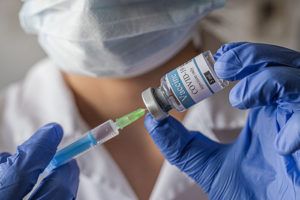UK schedule for Covid vaccine delivery falls behind
Report: Supply timelines dependent on late-stage data readouts
Per a report by Reuters, the timetable for delivery of the Oxford University/AstraZeneca Covid-19 vaccine candidate (AZD1222, ChAdOx1 nCoV-19) has slipped. UK vaccine chief Kate Bingham, according to the report, said that Britain will receive just four million doses of the shot this year. As this Lancet article and a separate Reuters report explain, the vaccine is made from a weakened version of a common cold virus that causes infections in chimpanzees—the chimpanzee cold virus has been genetically modified to include the genetic sequence of the spike protein, which SARS-CoV-2, the novel coronavirus that causes COVID-19, travels on to enter human cells.

In May, Britain agreed to take 100 million doses of the vaccine, with 30 million doses originally estimated for delivery by September, after UK's Medicines and Healthcare products Regulatory Agency (MHRA) said that clinical trials of the vaccine candidate were safe to continue. Across the pond, the FDA authorized a trial restart in late October. The exact timing for delivery is uncertain at this point, as it depends on infection numbers.
Bingham, Reuters reports, said that the vaccine was being made initially in bulk (drug substance) but could not yet be transferred into vials until more certainties of the timing of late-stage trial data delivery. She added that once the vaccine is put in vials, the clock for shelf life—and how soon one can use the product—begins.
AZ, in a written statement to Reuters, indicated it was making progress to start supplying hundreds of millions of doses on a rolling basis once it receives regulatory approvals. The Oxford/AZ candidate is likely to be among the first vaccines from big pharma to be submitted for governmental authorization.
For an overall look at the regulatory picture for Covid-19 vaccines, read Pharmaceutical Commerce's chat with Dr. Ash Ramzan of Woodley BioReg Ltd.